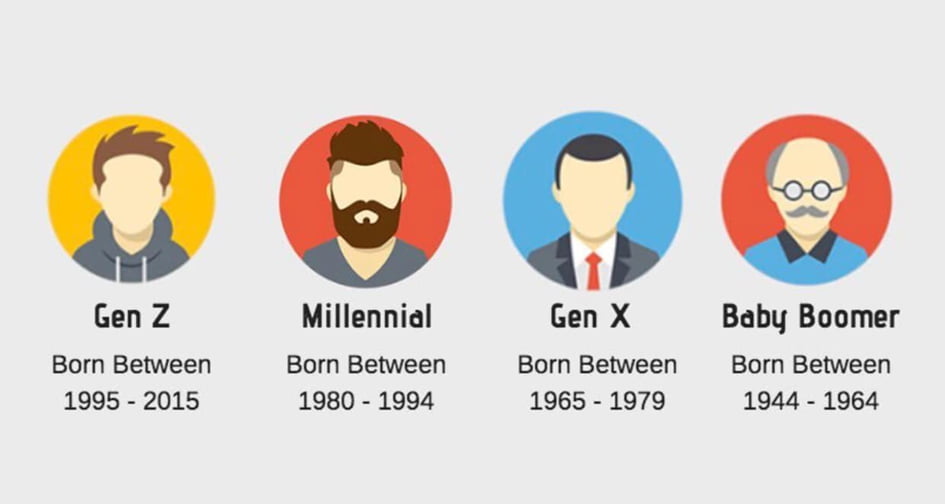Do you know that generational differences affect individual relation to gambling? Are you also aware that generational trends have great influence on individual gambling habits?interesting! Then you should watch this space for more interesting highlights.
Beverly Greer once told the story of how he spent several hours playing his favorite casino games with his siblings, his parents and his grandparents. This happened while the entire family was on a multi-generational family vacation.

From Beverely’s story, it might interest you to know that while their experiences in the casino paved way for some exciting conversations at dinner, his mum made complaints of how much money sha had lost. She actually got a bit infuriated when Beverly made his comment on her loss, that the only reason she had such poor luck was that she had been playing slots all day!
Subsequent debate amongst the entire family about which were the best casino games to play led to a conclusion which spurred the realization that Beverly’s parents and uncles preferred the slot machines, while his grandparents played keno or bingo all day. His siblings, however, joined him at the blackjack tables.

One thing that this story brings to mind and its conceived relevance to this article is how differences in generations operate to affect gambling habits and relations. This article will enlighten you on how different generations relate to gambling, from Boomers to gen Z.
Research has shown that the cultural attitudes towards gambling and finances during childhood periods and teenage years had a significant impact on each generation’s gambling habits today.
A follow-up on this article will suffice for an overview of what the relation was exactly for each generation as well as gambling trends that exist for each of those generations today.
THE SILENT GENERATION (1925-1945)
Before we move on to consider the relation to gambling, of the Boomer’s generation, we shall quickly take an overview of the silent generation.
The article released by Time magazine in 1951 made some reference to the children who were born during the Great depression period, say the period between nineteen twenty five up till nineteen forty five (1925-1945), as the Silent Generation. Although the author of the same article claimed that the name – Silent Generation – had already been in use before then.
As interesting as this may seem, the name “silent generation” was borne majorly from the fact that those children who were born in the great depression period grew up with the mentality that children are supposed “to be seen and not to be heard”. It makes sense now? They were raised to believe that children ought always to be silent, so they often worked, even more than they played. They also grew up with political tension that discouraged people from talking about their opinions.
There was hardly a form of gambling which was not strictly outlawed while the silent generation was growing up; virtually of forms of gambling were. As at this period, Horse race betting was the only legal form of gambling,even though it was still prohibited in some states. Casinos were beginning to open in Las Vegas, but they were often associated with organized crime. For the most of what was considered sinful, criminal, and irresponsible, gambling was not found wanting.
Presently, as it appears, the Silent Generation still happens to be the most morally opposed to gambling. According to a study conducted by St. Cloud State University, 32% of seniors say that they are opposed to gambling for religious or moral reasons. Lotteries and raffle tickets are their most preferred form of gambling, with almost 40% of those surveyed saying that they had bought a lottery ticket within the past year .Conversely, less than 10% have played card games within the past year, and only about 2% had played craps or other dice games,while about 63% of seniors from the Silent Generation participate in some form of gambling each year.
If we are to consider how those in this generation grew up, it makes sense that the Silent Generation gambles less than the other generations. Most of them do not remember the Great Depression, but they were born in the midst of it, and its effects greatly influenced their childhood. The fact that they were particularly careful with their finances earned this generation a more disposable income during their retirement, and they are willing to use it to have a little fun.
BABY BOOMERS (1946-1964)
It has become common knowledge that baby boomers were so named because of the spike in birth rate that followed the return of American soldiers from the war. The 76,000 baby boomers were the children born as a result of that record-high birth rate, and they were born into post-war America. By way of some good fortune, these children benefitted from government subsidies in housing and education, they also grew up wealthier than any other generation before them.
The wealth and affluence that characterized their growth gave the baby boomers an unprecedented sense of consumerism. They grew up getting more, so by the time they reached adulthood, they were greedy for the next best thing. The baby boomer’s generation were the rock-and-roll generation, and they were hell bent on making sure that every body was aware of it.
The youngest baby boomers were born the same year that New Hampshire legalized the modern state-run lottery.By the time they were coming of age, thirty-two states had authorized lotteries, and the Multi-State Lottery Association, MUSL, started. Casinos were limited to Las Vegas, but the boomers brought casinos to Atlantic City in 1978. Horse racing was popular in most states, but it declined as the boomers aged.
Baby boomers were the first generation to challenge the religious traditions of their parents. To them, gambling was nothig sinful, it was just cool, I mean, and they rebelled against anything that told them they were not allowed to do something. All thanks to their background!
Because of their rebellious morality and prosperous economy, baby boomers as a generation enjoys gambling. The same study that we mentioned above explained that 80% of baby admit that they have gambled within the past year.They prefer lotteries and local casinos, probably because they are convenient and readily available. In terms of particular games, baby boomers prefer slot machines and bingo to card games.
Another study found that baby boomers prefer games that are easy to understand, and they don’t like to wait for their preferred machine.
GENERATION X (1965-1979)
By the time the older baby boomers grew up, they became a generation of working parents and then social trends began to change. More women joined the workforce than before, divorce was common, and the birth rate dropped when the birth control pill became available.
The children born in the midst of these changes later became known as Generation X. These children were latchkey kids who grew up on MTV and grunge music.
Generation X grew up with a lot of instability. Government funding got taken away from programs that benefitted children and distributed to the elderly. Their society focused on the needs of adults more than those of children. But, against all odds,once they grew up, Generation X became a group of entrepreneurs that brought on the technological revolution. Businesses characterized them as a generation with a strong work ethic and people who are skilled problem-solvers.
They focused on finding a work-life balance, and as a result, they are happier adults than other generations. Today, approximately 82% of Gen Xers gamble each year, and they are much more open to social bets and online gambling than the generations before them.
As a group, they are not as opposed to gambling on the grounds of morality or religion as their predecessors were.
It is important to note here that although generation backgrounds have certain effects on relation to gambling, yet not every outliers follow the trend of their cohort. In essence, this article focuses on the patterns that formed a trend in every generation, it is no strict rule. It doesn’t yet apply to everyone.
All things being equal, it is probably about time that the gambling industry gets a facelift. A lot of the casinos in Las Vegas have taken no new shape since the 1980s, and it is necessary to update if they want to keep up with younger generations.
It is highly recommended that Leaders in the gambling industry should study the generational differences and conduct surveys to get opinions from millennials about how they can improve.




